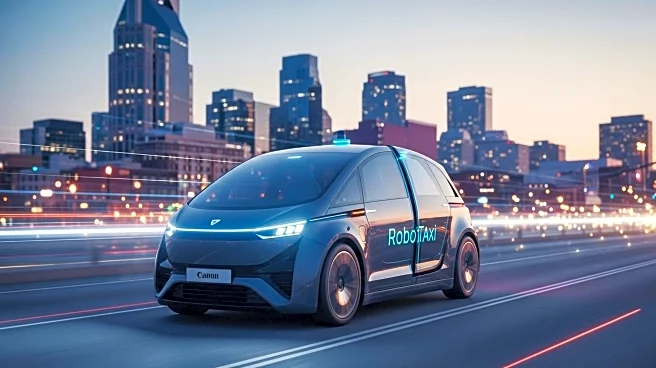What's Happening?
Waymo, the autonomous vehicle division of Alphabet, is expanding its robotaxi service to Nashville in partnership with Lyft. The company plans to begin autonomous operations in the city in the coming months, with public access expected next year. This expansion is part of Waymo's broader strategy to increase its presence in urban areas across the United States. The company has already received a pilot permit to operate at San Francisco International Airport and is authorized to operate fully autonomously at San José Mineta International Airport. Waymo's current operations include cities like Phoenix, San Francisco, Los Angeles, Atlanta, and Austin, with plans to expand to other cities such as Denver, Seattle, and Dallas.
Why It's Important?
Waymo's expansion into Nashville and other cities signifies a significant shift in urban transportation, potentially reducing reliance on traditional vehicles and public transport. This move could lead to increased competition in the ride-hailing market, particularly affecting companies like Uber and Lyft. The introduction of autonomous vehicles also raises questions about regulatory frameworks, safety standards, and the future of employment in the transportation sector. As Waymo continues to develop its technology, the company reports a significant reduction in accidents compared to human drivers, which could enhance public safety and reduce traffic congestion.
What's Next?
Waymo's partnership with Lyft in Nashville will involve Lyft managing the robotaxi fleet, including maintenance and cleaning, while Waymo focuses on the self-driving technology. The company plans to continue its expansion into other cities, with Denver and Seattle on the horizon. Waymo is also working on integrating its technology into new vehicle models, such as the all-electric Zeekr RT and Hyundai's Ioniq 5 SUV. As the company expands, it will need to navigate regulatory challenges and public acceptance of autonomous vehicles.
Beyond the Headlines
The expansion of autonomous vehicles like Waymo's robotaxis could have long-term implications for urban planning and infrastructure. Cities may need to adapt to accommodate these vehicles, potentially leading to changes in road design, traffic management, and parking facilities. Additionally, the widespread adoption of autonomous vehicles could influence cultural attitudes towards car ownership and personal transportation.










